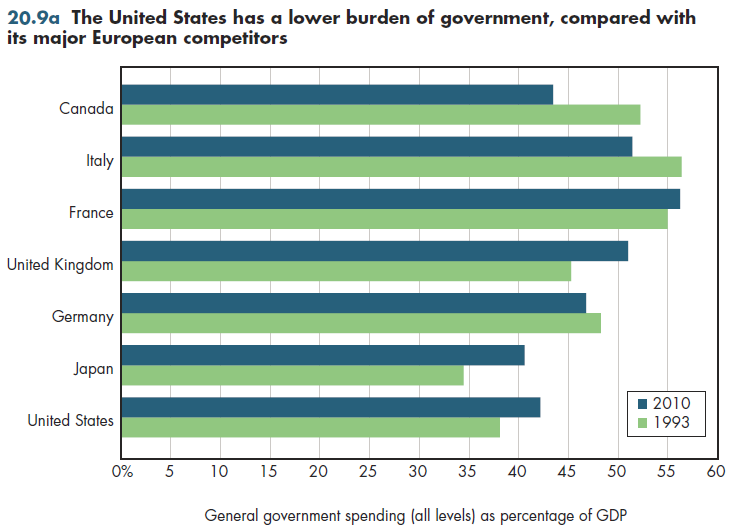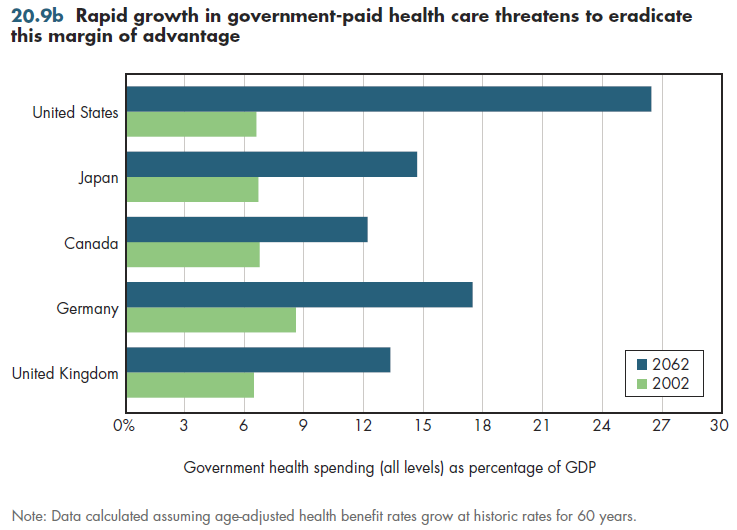Download PowerPoint versions of both figures.
20.9 Projected Increase in US Government-Related Health Spending and Its Effect
Summary: Projected increases in government-related health spending could, within 50 years, eradicate the margin of advantage that the United States currently has over its major European competitors in terms of the burden of government.
The United States holds a considerable margin of advantage over its major European rivals in terms of the government share of GDP (figure 20.9a). Compared with countries such as Italy, France, and the UK, that margin of advantage is approximately 10 percent of GDP; in the case of Germany, it exceeds 5 percent of GDP. The size of government (all levels) in Canada and Japan is much more comparable to that of the United States.

Although much of U.S. federal spending has been deficit-financed in recent years, that situation cannot continue indefinitely. Eventually, increased government spending as a percent of GDP translates into relatively higher taxes and the hidden efficiency costs they impose. At the margin, these efficiency losses in the United States amount to more than 40 cents on the dollar. All other things being equal, a country that can minimize such efficiency losses will outperform a nation that has a larger government.
However, absent changes in policy, this margin of advantage could be more than eradicated over the next 50 years simply through increases in mandatory federal health spending for the aging population in the United States (figure 20.9b). Other nations also face a rising tax burden for aging populations. The size of their burden is less, for two reasons. First, many countries are ahead of the United States in terms of the share of their populations that is elderly. Thus, they have comparatively less future aging to address. Second, in nations with universal coverage, government already has been financing their health care in advance of retirement. The incremental increase in tax burdens associated with an already-covered 64-year-old becoming 65 is far less than for a U.S. retiree whose health care for the first time is a federal responsibility.

The United States has been able for decades to enjoy the highest standard of living in the world only by maintaining one of the world's most highly competitive economies. Unless it can address its entitlements crisis without impairing its own competitiveness, the nation might find itself unable to afford either the health care or other goods that its residents desire. Conversely, by addressing entitlements in a responsible fashion, the United States can continue to afford investments in health care that provide good value for the money, with the attendant increases in longevity and years of healthy life that are reasonable to expect from a high-performing health care system.
Downloads
References
- Hagist C and L Kotlikoff. Who's Going Broke? Comparing Healthcare Costs in Ten OECD Countries. NBER Working Paper No. 11833. December 2005.
- Organisation for Economic Co-operation and Development.
Content actions
Give feedback:
Add module to:
Reuse / Edit:
Twin Cities Campus:
- © 2012 Regents of the University of Minnesota. All rights reserved.
- The University of Minnesota is an equal opportunity educator and employer. Privacy
- Last modified on Sep 24, 2013 3:10 pm -0500









